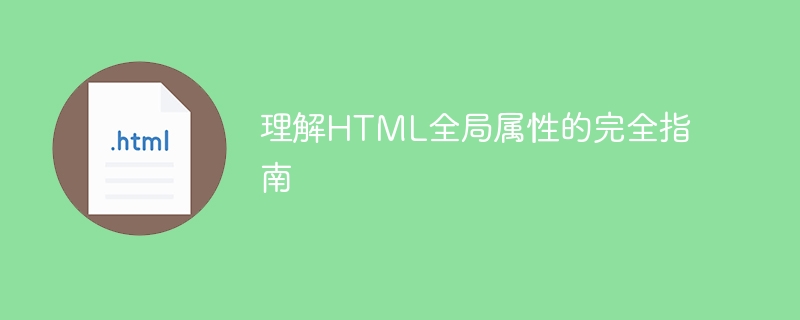The Complete Guide to Understanding HTML Global Properties

Complete guide to understanding HTML global attributes, specific code examples required
When writing HTML code, we usually use various elements and attributes to describe the structure of a web page and content. Some of these elements are global attributes, which means they can be applied to any HTML element. Understanding and correctly using these global properties is critical to developing high-quality web pages. This article will comprehensively introduce HTML global attributes and give specific code examples.
Global attributes are attributes that can be used by all HTML elements. They are not restricted to specific elements. The following are some common global attributes defined in HTML5:
-
#class: used to specify the class name of the element, which can be used to set styles or select elements in JavaScript.
<div class="container">
<p class="text">这是一个示例文本。</p>
</div>id: Used to specify a unique identifier for an element, similar to giving the element a name. Unlikeclass,idmust be unique and cannot be reused.
<div id="header">
<h1 id="这是一个标题">这是一个标题</h1>
</div>style: Used to specify style attributes for elements. Styles can be set directly in HTML or through CSS style sheets.
<p style="color: blue; font-size: 16px;">这是一个蓝色的段落,字体大小为16像素。</p>
title: Used to provide an additional descriptive information for the element, usually displayed in the form of a tool tip when the mouse is hovered.
<a href="https://www.example.com" title="这是一个链接">示例链接</a>
data-*: Used to store custom data in elements that can be read and modified in JavaScript. The*part can be any customized attribute name.
<button data-id="1" data-name="John">点击</button>
aria-*: Used to provide related attributes for accessibility (Accessibility) to help assistive devices such as screen readers understand and navigate web content.
<div role="button" aria-label="打开菜单">菜单</div>
In addition to the global attributes listed above, there are some other global attributes, such as lang, dir, hidden Etc., they all have their own uses and scopes. By understanding the role of these global properties, we can build web pages more efficiently and improve the user experience.
It should be noted that although global attributes can be applied to any HTML element, not all elements are sensitive to all global attributes. For example, the data-* attribute is only meaningful when used in JavaScript, and for some elements that do not support styles, such as <img alt="The Complete Guide to Understanding HTML Global Properties" >, <br> etc., style attribute is invalid.
To sum up, understanding and correctly using HTML global attributes is crucial to developing high-quality web pages. By rationally utilizing these global attributes, we can better manage and organize web content and improve user experience. I hope the code examples in this article can help you better understand and use HTML global attributes.
The above is the detailed content of The Complete Guide to Understanding HTML Global Properties. For more information, please follow other related articles on the PHP Chinese website!

Hot AI Tools

Undresser.AI Undress
AI-powered app for creating realistic nude photos

AI Clothes Remover
Online AI tool for removing clothes from photos.

Undress AI Tool
Undress images for free

Clothoff.io
AI clothes remover

Video Face Swap
Swap faces in any video effortlessly with our completely free AI face swap tool!

Hot Article

Hot Tools

Notepad++7.3.1
Easy-to-use and free code editor

SublimeText3 Chinese version
Chinese version, very easy to use

Zend Studio 13.0.1
Powerful PHP integrated development environment

Dreamweaver CS6
Visual web development tools

SublimeText3 Mac version
God-level code editing software (SublimeText3)

Hot Topics
 1386
1386
 52
52
 Table Border in HTML
Sep 04, 2024 pm 04:49 PM
Table Border in HTML
Sep 04, 2024 pm 04:49 PM
Guide to Table Border in HTML. Here we discuss multiple ways for defining table-border with examples of the Table Border in HTML.
 HTML margin-left
Sep 04, 2024 pm 04:48 PM
HTML margin-left
Sep 04, 2024 pm 04:48 PM
Guide to HTML margin-left. Here we discuss a brief overview on HTML margin-left and its Examples along with its Code Implementation.
 Nested Table in HTML
Sep 04, 2024 pm 04:49 PM
Nested Table in HTML
Sep 04, 2024 pm 04:49 PM
This is a guide to Nested Table in HTML. Here we discuss how to create a table within the table along with the respective examples.
 HTML Table Layout
Sep 04, 2024 pm 04:54 PM
HTML Table Layout
Sep 04, 2024 pm 04:54 PM
Guide to HTML Table Layout. Here we discuss the Values of HTML Table Layout along with the examples and outputs n detail.
 HTML Input Placeholder
Sep 04, 2024 pm 04:54 PM
HTML Input Placeholder
Sep 04, 2024 pm 04:54 PM
Guide to HTML Input Placeholder. Here we discuss the Examples of HTML Input Placeholder along with the codes and outputs.
 Moving Text in HTML
Sep 04, 2024 pm 04:45 PM
Moving Text in HTML
Sep 04, 2024 pm 04:45 PM
Guide to Moving Text in HTML. Here we discuss an introduction, how marquee tag work with syntax and examples to implement.
 HTML Ordered List
Sep 04, 2024 pm 04:43 PM
HTML Ordered List
Sep 04, 2024 pm 04:43 PM
Guide to the HTML Ordered List. Here we also discuss introduction of HTML Ordered list and types along with their example respectively
 HTML onclick Button
Sep 04, 2024 pm 04:49 PM
HTML onclick Button
Sep 04, 2024 pm 04:49 PM
Guide to HTML onclick Button. Here we discuss their introduction, working, examples and onclick Event in various events respectively.




